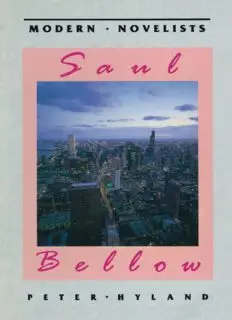
Saul Bellow PDF
Preview Saul Bellow
MODERN NOVELISTS General Editor: Norman Page MODERN NOVELISTS Published titles SAUL BELLOW Peter Hyland ALBERT CAMUS Philip Thody IVY COMPTON-BURNE'IT Kathy Justice Gentile FYOOOR DOSTOEVSKY Peter Conradi WIWAM FAULKNER David Dowling GUSrAV E FLAUBERT David Roe E. M. FORSTER Norman Page ANDRE GIDE David Walker WILliAM GOLDING James Gindin GRAHAM GREENE Neil McEwan CHRISfOPHER ISHERWOOD Stephen Wade HENRY JAMES Alan BeI1ringer JAMES JOYCE Richard Brown D. H. LAWRENCE G. M. Hyde ROSAMOND LEHMANN Judy Simons OORIS LESSING Ruth Whittaker MALCOLM LOWRY Tony Bareham THOMAS MANN Martin Travers GEORGE ORWELL Valerie Meyers ANTHONY POWELL Neil McEwan MARCEL PROUST Philip Thody BARBARA PYM Michael Cotsell JEAN-PAUL SARTRE Philip Thody SIX WOMEN NOVELISI'S Merryn Williams MURIEL SPARK Norman Page JOHN UPDIKE Judie Newman EVELYN WAUGH Jacqueline McDonnell H. G. WELLS Michael Draper VIRGINIA WOOLF Edward Bishop Forthcoming titles MARGARET ATWOOD Coral Ann Howell JOSEPH CONRAD Owen Knowles GEORGE ruOT Alan Bellringer scorr F. FITZGERALD John Whitley JOHN FOWLES James Acheson ERNFSf HEMINGWAY Peter Messent FRANZ KAFKA Ronald Spiers and Beatrice Sandberg NORMAN MAILER Michael Glenday V. S. NAIPAUL Bruce King PAUL SCarf G. K. Das PATRICK WHITE Mark Williams MODERN NOVELISTS SAUL BELLOW Peter Hyland Macmillan Education ISBN 978-0-333-51697-3 ISBN 978-1-349-22109-7 (eBook) DOI 10.1007/978-1-349-22109-7 © Peter Hyland 1992 Softcover reprint of the hardcover 1st edition 1992 All rights reserved. For infonnation, write: Scholarly and Reference Division, S1. Martin's Press, Inc., 175 Fifth Avenue, New York, N.Y. 10010 First published in the United States of America in 1992 ISBN 978-0-312-07598-9 Library of Congress Cataloging-in-Publication Data Hyland, Peter. Saul Bellow I Peter Hyland. p. cm.-(Modem novelists) Includes bibliographical references (p. ) and index. ISBN 978-0-312-07598-9 1. Bellow, Saul-Criticism and interpretation. I. Title. II. Series. PS3503.E4488Z7 1992 813'.52-dc20 91-39681 CIP Contents Note on References Vll General Editor's Preface Vlll 1 Life and Career 1 2 Novels of the Forties 12 3 Novels of the Fifties 31 4 Novels of the Sixties and Seventies 58 5 Novels of the Eighties 88 6 Short Stories 119 7 Literary Status 128 Notes 133 Select Bibliography 137 Index 139 v Every effort has been made to trace copyright-holders but if any have been inadvertently overlooked the publishers will be pleased to make the necessary arrangement at the first opportunity. VI Note on References It is the policy of this series to identify quotations from the texts by using chapter numbers. This raises problems with Saul Bellow's novels, some of which have unnumbered sections. To maintain uniformity, 'phantom' numbers have been assigned to the unnum bered divisions of the following novels: Herzog, Humboldt's Gift, More Die of Heartbreak, A Theft and The Bellarosa Connection. Quota tions from Dangling Man are identified by the date of entry in Joseph's journal. VII General Editor's Preface The death of the novel has often been announced, and part of the secret of its obstinate vitality must be its capacity for growth, adaptation, self-renewal and self-transformation: like some vigor ous organism in a speeded-up Darwinian ecosystem, it adapts itself quickly to a changing world. War and revolution, economic crisis and social change, radically new ideologies such as Marxism and Freudianism, have made this century unprecedented in human history in the speed and extent of change, but the novel has shown an extraordinary capacity to find new forms and techniques and to accommodate new ideas and conceptions of human nature and human experience, and even to take up new positions on the nature of fiction itself. In the generations immediately preceding and following 1914, the novel underwent a radical redefinition of its nature and possibilities. The present series of monographs is devoted to the novelists who created the modern novel and to those who, in their turn, either continued and extended, or reacted against and rejected, the traditions established during that period of intense exploration and experiment. It includes a number of those who lived and wrote in the nineteenth century but whose innovative contribution to the art of fiction makes it impossible to ignore them in any account of the origins of the modern novel; it also includes the so-called 'modernists' and those who in the mid- and late twentieth century have emerged as outstanding practitioners of this genre. The scope is, inevitably, international; not only, in the migratory and exile-haunted world of our century, do writers refuse to heed national frontiers - 'English' literature lays claim to Conrad the Pole, Henry James the American, and Joyce the Irishman - but geniuses such as Flaubert, Dostoevsky and Kafka have had an influence on the fiction of many nations. Each volume in the series is intended to provide an introduction VllI General Editor's Preface IX to the fiction of the writer concerned, both for those approaching him or her for the first time and for those who are already familiar with some parts of the achievement in question and now wish to place it in the context of the total oeuvre. Although essential information relating to the writer's life and times is given, usually in an opening chapter, the approach is primarily critical and the emphasis is not upon 'background' or generalizations but upon close examination of important texts. Where an author is notably prolific, major texts have been made to convey, more summarily, a sense of the nature and quality of the author's work as a whole. Those who want to read further will find suggestions in the select bibliography included in each volume. Many novelists are, of course, not only novelists but also poets, essayists, biographers, dramatists, travel writers and so forth; many have practised shorter forms of fiction; and many have written letters or kept diaries that constitute a significant part of their literary output. A brief study cannot hope to deal with all these in detail, but where the shorter fiction and the non-fictional writings, public and private, have an important relationship to the novels, some space has been devoted to them. NORMAN PAGE
